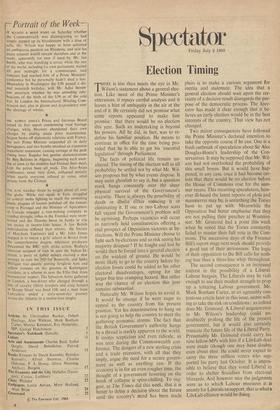Election Timing
rrHERE is less than meets the eye in Mr. I Wilson's statement about a general elec- tion. Like most of the Prime Minister's utterances, it repays careful analysis and it leaves a hint of ambiguity in the air at the end.of it. He certainly did not promise what some reports appeared to make him promise : that there would be no election this year. Such an undertaking is beyond his powers. All he did, in fact, was to re- define his familiar position. He means to continue in office for the time being pro- vided that he is able to get his 'essential legislation' through Parliament.
The facts of political life remain un- altered. The timing of the election will in all probability be settled not by what Mr. Wil- son proposes but by what events dispose. It may seem ghoulish to say it, but a question mark hangs constantly over the sheer physical survival of the Government's majority. There is always the possibility of death or illness either reducing. it or eliminating it. If one or two Labour seats fall vacant the Government's problem will be agonising. Perhaps vacancies will occur in narrowly held constituencies offering a real prospect of Opposition victories at by- elections. Will the Prime Minister choose to fight such by-elections and so risk seeing his majority disapear'? If he fought and lost he would then be forced into a general election on the weakest of ground. He would be more likely to go to the country before by- election losses could be added to his other electoral disadvantages, opting for the larger but less cramping hazard. But either way the chance of an election this 'year remains substantial.
Naturally Mr. Wilson hopes to avoid it. It would be strange if he were eager to appeal to the country from his present position. Yet his determination to hang on is not going to help the country to meet the gathering economic storms. The fact that the British Government's authority hangs by a thread is starkly apparent to the world. It invites scepticism and even ridicule, as' was seen during the Commonwealth con- ference. The dangers of a new sterling crisis and a trade recession, with all that they imply, argue the need for a secure govern- ment as well as anything can. If the economy is in for an even rougher time, the thought of a government hovering on the brink of collapse is spine-chilling. To sug- gest. as The Times did this week, that it is better to delay a decision about the future until the country's mind has been made plain is to make a curious argument for inertia and stalemate. The idea that a general election should wait upon the cer- tainty of a decisive result disregards the pur- pose of the democratic process. The Spec- tator has made it clear enough that it be- lieves an early election would be in the best interests of the country. That view has Snot changed.
Two minor consequences have followed the Prime Minister's declared intention to take the opposite course if he can. One is a fresh outbreak of speculation about Sir Alec Douglas-Home's leadership of the Con- servatives. It may be supposed that Mr. Wil- son had not overlooked the probability of this small bonus. But it would have hap- pened, in any case, once it had become cer- tain that there would be no election before the House of Commons rose for the. sum- mer recess. This recurring speculation, how- ever ill-based the latest reports of plots and manoeuvres may b-e, is something the Tories have to put up with. Meanwhile the Opposition had better emphasise that they are not pulling their punches at Westmin- ster. Mr. Grimond had a point this week when he noted that the Tories constantly failed to muster their full vote in the Com- mons. The successive days of the Finance Bill's report stage next week should provide a good test of their seriousness. The logic of their oppoSition to the Bill calls for noth- ing less than a three-line whip throughout.
The second consequence is an increased interest in the possibility of a Liberal- Labour bargain. The Liberals may be rash enough to use their modest strength to prop up a tottering Labour government. Mr. Mark Bonham Carter, in an agreeably con- tentious article later in this issue, seems will- ing to take the risk on conditions : as indeed does Mr. Grimond. A Liberal acquiescence in Mr. Wilson's leadership could un- doubtedly prolong the life of the present government, but it would also certainly truncate the future life of the Liberal Party. Presumably Mr. Grimond could carry his nine fellow-MPs with him if a Lib-Lab deal were made (though one may have doubts even about this). He could never expect to carry the three million voters who sup- ported his party last October. It is impos- sible to believe that they voted Liberal in order to shelter Socialism from electoral blizzards. And however nice the judgments were as to which Labour measures it is seemly for Liberals to support, that is what a Lib-Lab alliance would be doing.










































 Previous page
Previous page